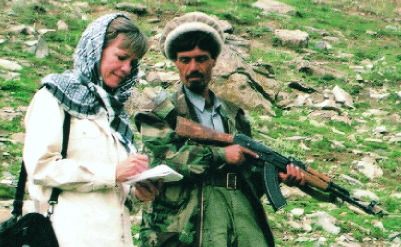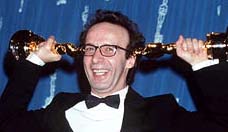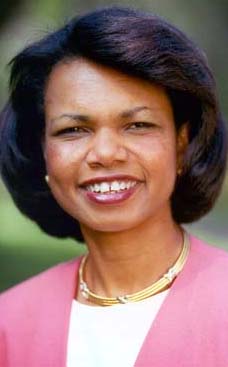2006.03.04: March 4, 2006: Headlines: Journalism: First Amendment: Freedom of Speech: Santa Cruz Sentinel: Dana Priest says journalism sets the stage
Peace Corps Online:
Peace Corps News:
Speaking Out:
January 23, 2005: Index: PCOL Exclusive: Speaking Out (1 of 5) :
Archive of Stories:
2006.03.04: March 4, 2006: Headlines: Journalism: Speaking Out: Santa Cruz Sentinel: Dana Priest calls for Peace Corps for the 21st Century :
2006.03.04: March 4, 2006: Headlines: Journalism: First Amendment: Freedom of Speech: Santa Cruz Sentinel: Dana Priest says journalism sets the stage
Dana Priest says journalism sets the stage

Who presents the debate? Priest says it's an institution that is often under attack: the mainstream media. "The only way to set the stage is through journalism. All bureaucracies should be exposed to sunshine. The mainstream media plays a critical role. "Who's going to put the information out? Bush and the Republicans are in power. When they mess up, the Democrats are taking advantage, but they're not unearthing any new approaches.
Dana Priest says journalism sets the stage
Post reporter who exposed secret CIA prisons to speak in Santa Cruz
By TOM HONIG
Sentinel Editor
Caption: Dana Priest interviews an Afghan farmer in the mountains above Shomali in Afghanistan. Photo: NBC/Norman Ng
SANTA CRUZ — Dana Priest, traitor or Bush lackey?
Of course, she's neither. She's the Washington Post reporter who covers national security and intelligence, and the one who broke the story last year about secret prisons overseas.
She'll be speaking at UC Santa Cruz at 7:30 p.m. Monday, but don't expect her to be driving home any partisan points during her talk.
"I'm a reporter," she said during an interview in Santa Cruz last week. "I have the inclination that reporters should go forth and bring back information — and then let the reader decide what to do with it."
Priest graduated from UCSC in 1981, with a degree in politics. She's here to give a talk, as well as accept the campus's first Distinguished Social Sciences Alumni Award.
She's also under consideration for a Pulitzer Prize in international reporting because of her story on covert interrogation facilities overseas used by the CIA.
Priest acknowledges that a number of people want to use her story as evidence of Bush administration misbehavior, but her message is one of much greater complexity.
Advertisement
In fact, she said, other stories that she's uncovered just might be more important.
"For example," she said, "while people weren't looking, the military has been put in charge of foreign policy." And that trend started before the Bush presidency, when the U.S. intervened in Kosovo in the late '90s.
In the Balkans, in Afghanistan and in Iraq, she said, "the military is in charge of making war and making peace.
"It's not good. It's not that they the military are bad people. It's just that when you go to war to change the political leadership of a country, things get very different on the ground. ... The military option is not the way to go to counter terrorism."
Citing an old military saying, she said: "If all you have is a hammer, then all you see is a nail."
In the aftermath of her story on secret prisons, Priest said, she was criticized in blogs and on talk shows. Some said she was a traitor for breaking the story in the first place. Some criticized her for not going further and identifying the location of the prisons — beyond saying that many of them were in Eastern Europe.
On Friday, she met with a group of UCSC students who are interns at the university's Center for Global, International and Regional Studies. The director, Paul M. Lubeck, was Priest's professor when she was an undergrad.
She sat at a table at Upper Crust Pizza on Mission Street, and between bites of a pizza, she told the students why she and her editor, the Post's Leonard Downie, declined to identify the location of the prisons.
"It was our decision. ... It was not negotiated, because we hold all the cards," she said.
They refused to identify the prisons out of fear that their host countries would be targeted by terrorists. "It could get people killed," she explained.
Likewise, Priest said that the Post has refused to report on other details about the cooperation of intelligence operations between certain countries because the mere reporting of them would cause the cooperation to cease.
Nevertheless, her reporting has caused the administration discomfort. "This government is operating with a tremendous amount of secrecy," she said.
In addition, her stories have explored the tactics of the military and the CIA, and raised questions about using torture. "They are pushing the limits of the law and of morality," she said in the interview. She said that her stories, she hopes, could spark "a great debate about national security and tactics to deal with it. Are we on the right track?"
Who presents the debate?
Priest says it's an institution that is often under attack: the mainstream media. "The only way to set the stage is through journalism. All bureaucracies should be exposed to sunshine. The mainstream media plays a critical role.
"Who's going to put the information out? Bush and the Republicans are in power. When they mess up, the Democrats are taking advantage, but they're not unearthing any new approaches.
"The mainstream media has the resources and the experience. If we went away ... who would tell the story? Our motives are better than people think."
Contact Tom Honig at thonig@santacruzsentinel.com.
When this story was posted in March 2006, this was on the front page of PCOL:





Peace Corps Online The Independent News Forum serving Returned Peace Corps Volunteers
 | March 1, 1961: Keeping Kennedy's Promise
On March 1, 1961, President John F. Kennedy issues Executive Order #10924, establishing the Peace Corps as a new agency: "Life in the Peace Corps will not be easy. There will be no salary and allowances will be at a level sufficient only to maintain health and meet basic needs. Men and women will be expected to work and live alongside the nationals of the country in which they are stationed--doing the same work, eating the same food, talking the same language. But if the life will not be easy, it will be rich and satisfying. For every young American who participates in the Peace Corps--who works in a foreign land--will know that he or she is sharing in the great common task of bringing to man that decent way of life which is the foundation of freedom and a condition of peace. " |
 | The Peace Corps Library
The Peace Corps Library is now available online with over 40,000 index entries in 500 categories. Looking for a Returned Volunteer? Check our RPCV Directory. New: Sign up to receive PCOL Magazine, our free Monthly Magazine by email. Like to keep up with Peace Corps news as it happens? Sign up to recieve a daily summary of Peace Corps stories from around the world. |
 | Paid Vacations in the Third World?
Retired diplomat Peter Rice has written a letter to the Wall Street Journal stating that Peace Corps "is really just a U.S. government program for paid vacations in the Third World." Director Vasquez has responded that "the small stipend volunteers receive during their two years of service is more than returned in the understanding fostered in communities throughout the world and here at home." What do RPCVs think? |
 | RPCV admits to abuse while in Peace Corps
Timothy Ronald Obert has pleaded guilty to sexually abusing a minor in Costa Rica while serving there as a Peace Corps volunteer. "The Peace Corps has a zero tolerance policy for misconduct that violates the law or standards of conduct established by the Peace Corps," said Peace Corps Director Gaddi H. Vasquez. Could inadequate screening have been partly to blame? Mr. Obert's resume, which he had submitted to the Peace Corps in support of his application to become a Peace Corps Volunteer, showed that he had repeatedly sought and obtained positions working with underprivileged children. Read what RPCVs have to say about this case. |
 | Why blurring the lines puts PCVs in danger
When the National Call to Service legislation was amended to include Peace Corps in December of 2002, this country had not yet invaded Iraq and was not in prolonged military engagement in the Middle East, as it is now. Read the story of how one volunteer spent three years in captivity from 1976 to 1980 as the hostage of a insurrection group in Colombia in Joanne Marie Roll's op-ed on why this legislation may put soldier/PCVs in the same kind of danger. Latest: Read the ongoing dialog on the subject. |
 | PC establishes awards for top Volunteers
Gaddi H. Vasquez has established the Kennedy Service Awards to honor the hard work and service of two current Peace Corps Volunteers, two returned Peace Corps Volunteers, and two Peace Corps staff members. The award to currently serving volunteers will be based on a demonstration of impact, sustainability, creativity, and catalytic effect. Submit your nominations by December 9. |
 | Friends of the Peace Corps 170,000 strong
170,000 is a very special number for the RPCV community - it's the number of Volunteers who have served in the Peace Corps since 1961. It's also a number that is very special to us because March is the first month since our founding in January, 2001 that our readership has exceeded 170,000. And while we know that not everyone who comes to this site is an RPCV, they are all "Friends of the Peace Corps." Thanks everybody for making PCOL your source of news for the Returned Volunteer community. |
Read the stories and leave your comments.

Some postings on Peace Corps Online are provided to the individual members of this group without permission of the copyright owner for the non-profit purposes of criticism, comment, education, scholarship, and research under the "Fair Use" provisions of U.S. Government copyright laws and they may not be distributed further without permission of the copyright owner. Peace Corps Online does not vouch for the accuracy of the content of the postings, which is the sole responsibility of the copyright holder.
Story Source: Santa Cruz Sentinel
This story has been posted in the following forums: : Headlines; Journalism; First Amendment; Freedom of Speech
PCOL31889
00















